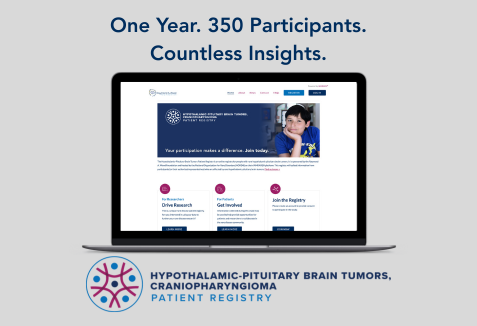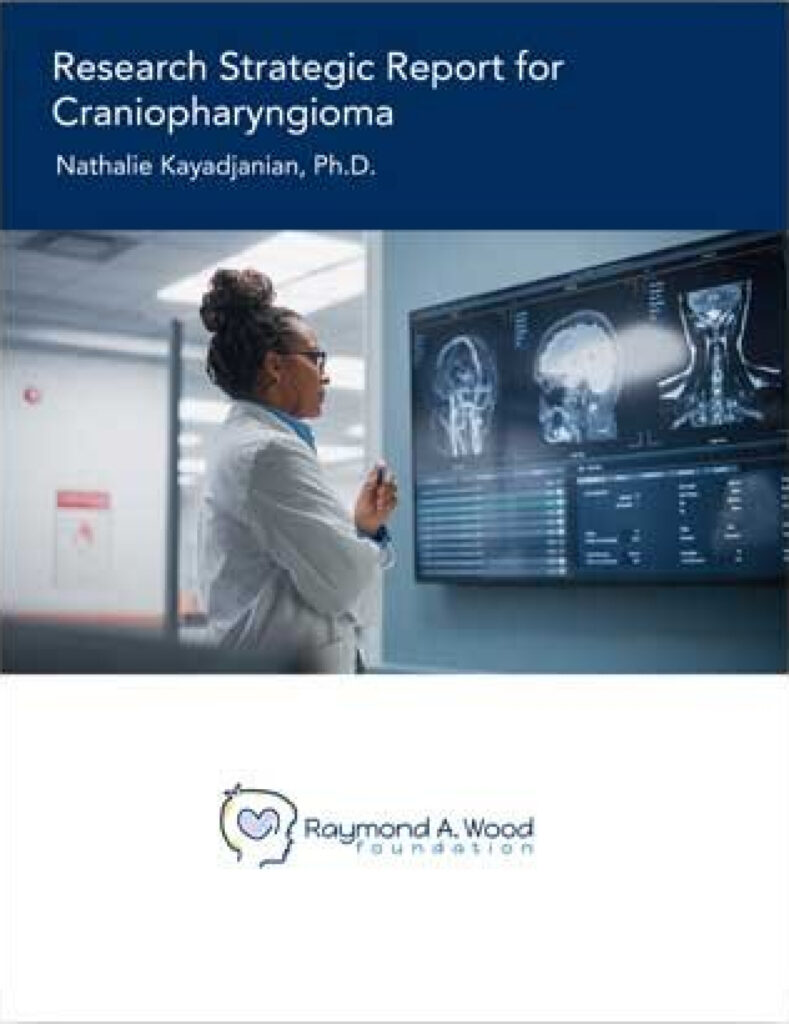Resources for Advancing Research in Hypothalamic-Pituitary Brain Tumors
At the Raymond A. Wood Foundation, we are committed to advancing the scientific understanding and clinical management of hypothalamic-pituitary brain tumors. This section is dedicated to providing researchers with comprehensive resources, cutting-edge data, and collaborative opportunities essential for pioneering research and innovative treatments.
Disease Information
Research Strategic Plan
To address the long, costly, and risky process of developing new therapies, RAWF has conducted a comprehensive assessment of research gaps and needs in hypothalamic-pituitary brain tumor studies. This has led to the creation of a patient-centered research strategic plan aimed at maximizing efficiency, reducing development time, and increasing the success of finding meaningful treatments. The plan includes a detailed gap analysis across all stages of drug development and infrastructure assessment.
3 Research Priorities
To drive the successful implementation of the RAWF’s strategic plan for research, three research priorities were identified:
Develop a patient registry to facilitate research, inform medical decision-making, identify patterns, and improve patient care and outcomes through a deeper understanding of diseases and their treatments
Gather evidence-based data on the viewpoints of patients and caregivers on symptoms of importance, treatment priorities, and benefit/risk evaluation.
Develop an international network of craniopharyngioma experts including clinicians, researchers, surgeons, and patients and caregivers.
Tools and Resources
To help you accelerate progress toward treatments that improve the lives of people diagnosed with or survivors of hypothalamic-pituitary brain tumors.
We support the development of many helpful tools and resources to assist you in accelerating the progress toward new scientific knowledge of and new therapies for hypothalamic-pituitary brain tumors and their comorbidities.
The Hypothalamic-Pituitary Brain Tumors Patient Registry is an international online registry for people with rare hypothalamic-pituitary brain tumors. It is sponsored by the Raymond A. Wood Foundation and hosted by the National Organization for Rare Disorders (NORD®) on their IAMRARE® platform. The registry collects information from participants (or their caregivers or authorized representatives) who are affected by rare hypothalamic-pituitary brain tumors. This information is used to create care guidelines, assist care teams providing care to individuals with or survivors of hypothalamic-pituitary brain tumors, and guide quality improvement at care centers.
Researchers can also use the Registry to conduct research. De-identified, aggregated data from the Registry is being shared with academic and industry collaborators conducting retrospective studies or conducting research and/or clinical trials on new therapies.
Learn More
To receive regular reports of data coming out of the Registry, please email us. For more information, email Nathalie Kayadjanian, Ph.D., Scientific Advisor.
In early 2020, the Raymond A. Wood Foundation began exploring the feasibility of developing a home-use blood sodium meter to aid in the management of AVP-D, a condition where the body cannot regulate fluid balance. Currently, there is no way to measure blood sodium outside of a lab, leading to frequent and often traumatic venous blood draws for patients, particularly children.
With the collaboration of medical professionals and financial support from NIH and the Raymond A. Wood Foundation, phase one is currently underway. The device aims to help patients manage AVP-D proactively, reducing the need for emergency visits and hospitalizations.
Find Out MoreRAWF is supporting the Children Brain Tumor Network (CBTN) who has collected brain tumor tissue and other biosamples from CBTN members and co-developed a suite of cloud-based data platforms that allow researchers to access a rich collections of hypothalamic-pituitary brain tumor data from anywhere in the world. This will help develop promising new studies that will support research on hypothalamic-pituitary brain tumors and aid in drug development and drug discovery.
Biosamples are processed and stored in the CBTN’s operations center located at Children’s Hospital of Philadelphia. These preserved specimens may then be requested by researchers and investigators. Each collected sample is paired with different types of data including clinical data from patient visits, imaging data from MRI scans, histology data from stained slides of tissue, genomic data extracted from whole genome sequencing (WGS) with paired RNAseq data and proteomic data. These data sets are reviewed for accuracy and any identifying information is removed from the data to protect the privacy of each and every research subject.
Find Out MoreRAWF is supporting the Craniopharyngioma Working Group of the Pediatric Neuro-Oncology Consortium (PNOC). Through international collaborative efforts, the consortium aims to investigate the molecular basis for craniopharyngioma and the mechanisms of tumor recurrence, drug resistance, and potential targetable pathways as well as contribute to the development of new craniopharyngioma disease models for drug testing.
Find Out MoreLatest RAWF Research News

New Frontiers in Hypothalamic Obesity Research

International Experts Convene in Denver for 8th Postgraduate Course in Childhood Craniopharyngioma

One Year. 350 Voices. Countless Insights.

New Study on Fatigue in Craniopharyngioma Survivors

Contact Us
For any questions or further assistance, our team is here to support your research endeavors. Whether you need detailed information on hypothalamic-pituitary brain tumors or more insight into our available resources and services, please reach out to us. Contact us directly via phone, email, or through our online contact form, and we will respond promptly to your inquiries..

